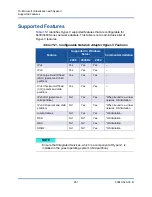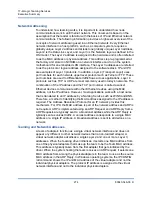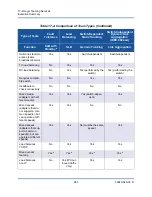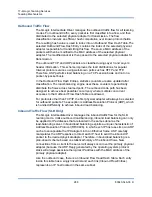
17–QLogic Teaming Services
Executive Summary
275
83840-546-00 D
For switch-independent teaming modes, all physical adapters that make up a
virtual adapter must use the unique MAC address assigned to them when
transmitting data. That is, the frames that are sent by each of the physical
adapters in the team must use a unique MAC address to be IEEE compliant. It is
important to note that ARP cache entries are not learned from received frames,
but only from ARP requests and ARP replies.
Description of Teaming Types
Smart Load Balancing and Failover
Link Aggregation (IEEE 802.3ad LACP)
There are three methods for classifying the supported teaming types:
The first is based on whether the switch port configuration must also match
the adapter teaming type.
The second is based on whether the team supports load balancing and
failover, or just failover.
The third is based on whether the Link Aggregation Control Protocol is used
or not.
shows a summary of the teaming types and their classification.
Table 17-2. Available Teaming Types
Teaming Type
Switch-Dependent
(Switch must
support specific
type of team)
Link
Aggregation
Control
Protocol
Support
Required on the
Switch
Load Balancing
Failover
Smart Load Bal-
ancing and
Failover (with
two to eight load
balance team
members)
✔
✔
SLB (Auto-Fall-
back Disable)
✔
✔
Link Aggrega-
tion (802.3ad)
✔
✔
✔
✔
















































